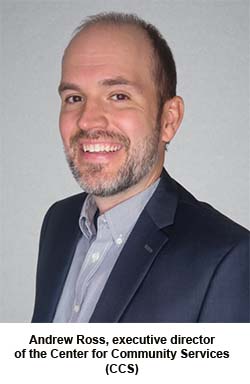All Blog Posts
How the Center for Community Services is Adapting to Meet Community Need in the Era of COVID-19
The Riley Institute’s Planning and Evaluation Capacity Building Initiative (PECBI) empowers nonprofit organizations to foster a culture of organizational learning around data and evaluation. As community needs grow due to the pandemic, we’re asking our PECBI partners what they’ve learned as they’ve adapted their services in this challenging time.
In the fourth installment of our Q&A series, Impact in the Era of COVID-19, we speak with Andrew Ross, Executive Director of the Center for Community Services (CCS).
Published September 29, 2020
This interview has been edited for clarity and brevity.
See all Impact in the Era of COVID-19 interviews
 For those who don’t know, tell us a bit about what the Center for Community Services does and who it serves.
For those who don’t know, tell us a bit about what the Center for Community Services does and who it serves.
The Center for Community Services is a collection of nonprofits working together to ensure that people have the tools needed to reach self-sufficiency. We recognize the barriers people in poverty face are numerous and layered, so we offer a variety of programming to meet people wherever they are on their journey. The Center helps families by offering programs in emergency financial and food assistance, childcare, healthcare, education, and employment. As a community organization, the Center primarily serves those who are struggling in the Golden Strip area of Greenville, which encompasses Simpsonville, Mauldin, and Fountain Inn.
What community needs has CCS identified as a result of COVID-19, and have they changed over the course of the pandemic?
Community needs are changing as quickly as our understanding of this pandemic. At first, the main issue was food insecurity because families were struggling with job loss and empty grocery shelves. While there were brief moratoriums on utility shut-offs and evictions, it was only a matter of time before they were reinstated. Many families simply stopped paying their utility bills and reallocated those funds for other pressing needs. With only one meager stimulus payment directed to families, decreased unemployment assistance, and the resumption of utility shut-offs, we are now seeing a perfect storm of crisis. Our phones ring constantly for those seeking financial assistance — the Center is one of the only options for families in the community we serve.
Are you undertaking any new initiatives to meet the community’s needs during the pandemic?
The Center has been fortunate enough to be considered one of the grant partners for COVID-19 funding that Greenville County received. We view this funding as not ours to simply manage — we want to determine how to maximize its utility in service of our community as a whole. Our staff continues to partner with churches, local businesses, and other agencies to see how we can best use the funds to support our community as it moves towards recovery. CCS currently is working offsite with agencies and schools to provide access to our utility assistance service, and we are continuing to find new ways to provide food assistance to those who are hungry in our area.
Are there any changes that you’ve made to your programs that you might consider integrating in the long-term, even once COVID-19 is behind us?
The Center has always prided itself on being nimble in the face of crisis. We regularly adjust our programming to fit the individual needs of our clients. We may continue to adjust our hours to meet the changing needs long-term, but I envision our case managers continuing to be more present in the community and not tied to their desks. With our new partnerships, we have learned to take advantage of the trust our partners have created with their neighbors so that we can help people who may be wary of stepping through our doors. Just as many churches have realized, our work should not be tied to a building, but to our community and those who live in it.
What’s been your biggest takeaway from this moment we’re in?
I think the biggest takeaway is how a community can always step up to match the intensity of any moment. This pandemic really knocked our country to its knees, but the kindness and generosity that has flowed and will continue to flow will always pick us back up.